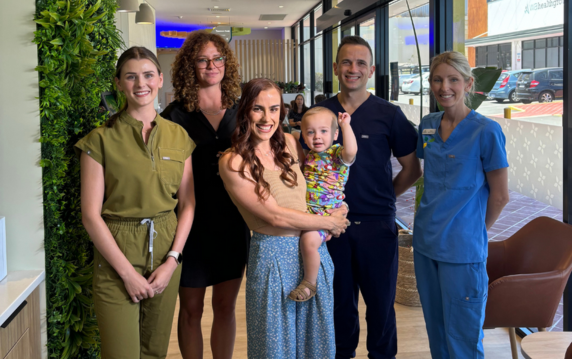Since opening six months ago, the Garden Pelvic Pain Clinic is hitting its stride, with a robust multidisciplinary team helping people suffering from endometriosis and pelvic pain.
With endometriosis affecting one in nine Australian women, the Australian Government has funded 20 endometriosis and pelvic pain clinics across Australia, including the Garden Pelvic Pain Clinic in Murdoch, to build the capacity of primary care to manage this condition and improve access to expert, multidisciplinary services.
Patients are provided with a personalised, evidence-based treatment plan through education, support and connection to a qualified multi-disciplinary team. Clinicians are focussed on the impact pain is having on a patient’s life and are led by treatment goals identified by patients, including improving quality of life, effective pain management, and improved daily functioning.

The Garden Pelvic Pain Clinic practice owner Dr Andrew Leech said patients feel heard and reassured they are in the right place to get the support they need.
“All patients receive a 45-minute screening phone call with our practice nurse ahead of booking their appointment, which determines if they are suitable for the service, and identifies the symptoms they are experiencing and the impact on their life.
“Our team works closely together to support our patients and ease the burden on them having to re-tell their story multiple times.”
Collaboration has been key to the successful operating of the clinic, with Dr Leech highlighting the value of strong relationships with local specialists.
Focused on a holistic model, the team includes an on-site pelvic pain physiotherapist who provides non-medicinal treatment for patients. The clinic has also started running pelvic pain specific pilates classes, facilitating peer support and connection and allowing patients to exercise in a supportive environment.
Since accepting patients in September 2023, 184 women have visited the clinic with an average of 2.88 interventions per patient. The clinic provides final discharge letters and a summary for a patient’s treating GP, encouraging the ongoing care to continue with their regular GP.
Dr Leech said this model of care is the future of primary care for chronic conditions, due to the speed of the process, accuracy of treatment, and access to a valuable multidisciplinary team.
“Patients especially appreciate being listened to (often for the first time about their pelvic pain) and being given time through longer appointments to holistically engage with their often-complex issues.”
Staff at the clinic have undertaken 14 education sessions around endometriosis and pelvic pain. These were run by allied health or specialist providers in endometriosis and chronic pelvic pain. Topics included the psychological impact of chronic pain, the challenges around diagnosis, and difficulties that minority groups may face finding the right care for endometriosis and pelvic pain. This has led to increased team satisfaction and upskilling, with staff appreciating being able to use their clinical reasoning skills to manage complex and interesting patient presentations.
The team will be visiting Broome and Fitzroy Crossing to connect with local GPs and find out more about the needs of Aboriginal women suffering from endometriosis and pelvic pain in these communities.
The Garden Pelvic Pain Clinic offer services across WA through GP, nurse and pelvic physiotherapist appointments via telehealth (video or phone). Existing and new patients can find out more and register for an initial appointment at thegardenmedical.com/service/pelvic-pain-clinic/ or by phoning 08 6186 7992.
This activity has been supported by funding provided by the Australian Government under the PHN Program.
